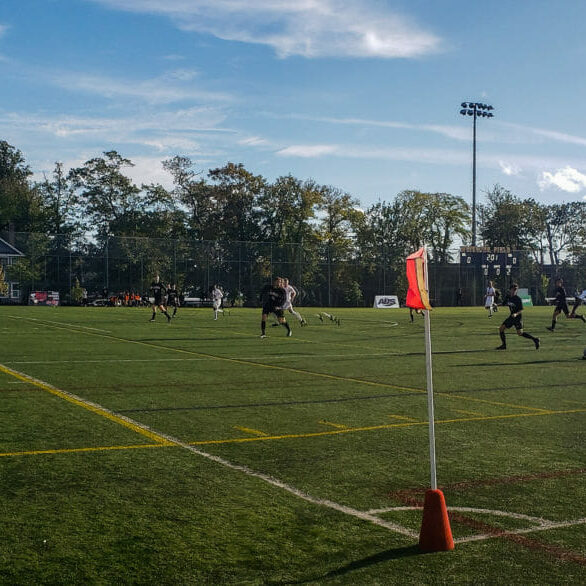
Pitch-side legacy
Pat Nearing is stepping back as men's soccer team head coach
Pat Nearing’s last game in charge of the Dalhousie University Tigers men’s soccer team was on Oct. 31, 2019. It was a quarter-final game, a big one, and they lost 2-1. It was a rainy scramble; the Saint Mary’s University Huskies doubled Dalhousie’s shots on net. The dramatic game-winning goal sent Dal home from the Atlantic University Sport (AUS) championships in Sydney, Cape Breton.
The loss isn’t likely to tarnish the legacy Nearing leaves behind. In 21 years, he’s led the Tigers to two AUS championships, won AUS coach of the year twice and coached a host of players who won MVP and All-star accolades.
Nearing announced his retirement from coaching (he’ll remain Dalhousie’s assistant director of Athletics) in late November.
The Gazette interviewed Nearing in his office, tucked away in the old part of the Dalplex. Around his L-shaped desk are photos of many Dalhousie varsity sports teams; hanging on a lamp is a cluster of lanyards marking past championships where his men have played.
Nearing’s passion for soccer developed long before coaching at Dalhousie.

Nova Scotia soccer roots
“I’ve always been a soccer guy,” says Nearing.
In the 1970s, he played soccer in junior high in Nova Scotia, in a time when hockey ruled the amateur sports scene.
He studied at Dalhousie and developed his game as a striker — though he says he played “anywhere” on the pitch — before going on exchange to the University of Leeds in England.
There, Nearing became a Leeds United fan, and gained friends who encouraged his passion for the game. In the early 1980s, Nearing tore a ligament—an injury he says made it difficult to play — and decided to try coaching.
First he coached Dartmouth United Moosehead’s second team, where he had played in the past. He led them for over 10 seasons.
Nearing came to Dalhousie in 1999. He was an assistant coach for just a week: the head coach resigned and suddenly Nearing was thrust into the world of university sports.
“At university, players are ‘in.’ Everyone wants to be there; everyone’s fighting for a spot,” says Nearing. He’s enjoyed the intensity and passion from players who must earn their roster spot.
When Nearing started at Dalhousie, he says there were no athletic scholarships available. Now, many varsity athletes are awarded scholarships, even full academic rides from the over $24 million Dal has for incoming students.
The league has become more serious. Schools like Cape Breton University have brought in international players, like Peter Schaale and Cory Bent. Both were drafted to Canadian Premier League teams in the new U Sports draft system.
That’s changed the way Nearing and his assistants prepare the team. “You get into a much more business type relationship in your recruiting,” he says.
Players say Nearing’s coaching style reflects the pressures of the game.
Playing for Nearing
“He can tell every single player on the field exactly what it is they can expect to do,” says Jeff Arkin. “He’s very serious when it comes to soccer, and very relaxed off the field.”
Arkin played defence during his undergraduate degree, as well as this past season while pursuing a master’s degree. Playing for Nearing again is a large part of why he returned to Dal.
Both Arkin and Jason Ross, who graduated from Dalhousie in 2016, were coached by Nearing before their Tiger days, during minor soccer in Bedford.
“He had a huge impact, on the field, but also just in my life,” says Ross. “He was always on your side.”
Coaching players like Arkin and Ross was one of Nearing’s favourite parts of the job, even after they left the team.
“One of the most gratifying parts of university coaching,” says Nearing, “is you get to follow these players on past the time when they can play for you.”
He’s seen players become doctors and community leaders. He’s kept in touch with many.
“You get to have an opportunity to impact young people striving for excellence academically and professionally,” says Tim Maloney, Dalhousie’s director of athletics. He’s worked with Nearing for the last five years.
“As someone who’s done so much for our program it’s sad to see him retire,” Maloney says. “But I’m really happy for him that he went out on his terms: he can now enjoy a little bit more time to himself and his family.”
While Nearing may not be pitch-side as often, his full-time job of assistant athletic director of the Tigers will keep him close to Wickwire Field.
Parting philosophy
In Nearing’s first year coaching, the Tigers played a game against Saint Mary’s University, their cross-town rivals. One of Dal’s top players transferred to the Huskies the year before. The AUS title and a trip to the national championship were on the line.
Dalhousie won 2-1. Nearing — and the team — was shocked.
“I turned to my assistant coach and I said ‘where are the nationals?’” Nearing says with a laugh. “We really had not expected it.”
The rivalry between Dal and SMU continued throughout Nearing’s coaching career. It even extended to summer leagues; Dal players tended to join one team, SMU players another.
“Everton and Liverpool, Saint Mary’s and Dalhousie,” Nearing explains, comparing it to historic battles between the two English clubs. “It’s something that’s always been and always will be.”
The rivalry will be passed to a new coach, someone who will have to learn about university recruiting and player development.
“That’s a big challenge,” says Nearing. “The second biggest challenge is creating a philosophy within the team, of how you want the team to operate.”
With his success bringing Dalhousie’s program into the era of athletic scholarships and international student transfers, Nearing’s legacy might be just that: his philosophy.
Arkin says Nearing is “a ‘player’s coach,’” someone whose razor-sharp knowledge of the game and high expectations of athletes never impacted the relationships he cultivated. Arkin remembers a coach whose congenial persona narrowed into a serious focus that spurred his players on from the sidelines.
“I think I value my time at Dalhousie a lot more,” says Arkin, “because of the experiences I’ve had with him.”






